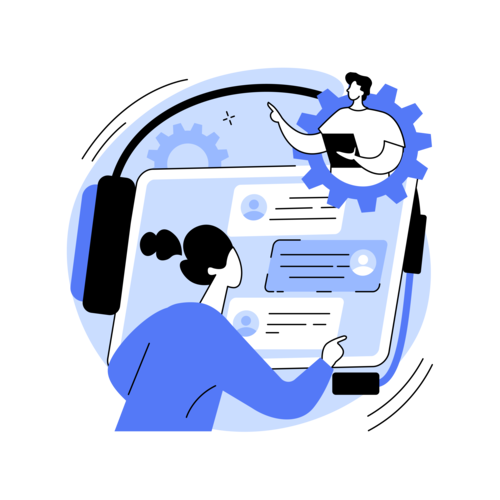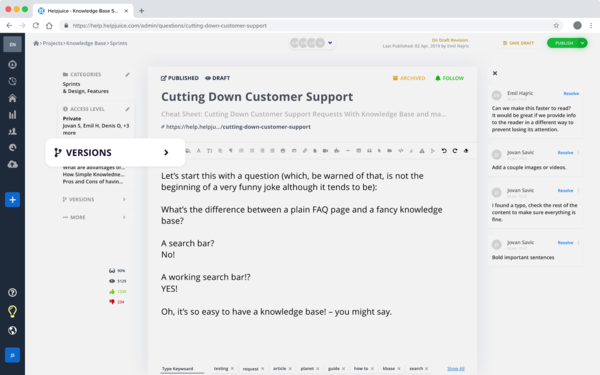
Imagine having a business system that anticipates your customers’ needs, learns from previous interactions to provide instant, relevant answers, and suggests proactive solutions.
That’s the power of AI in knowledge management (KM).
With AI, your customer support team no longer needs to answer the same questions repeatedly or go through mountains of outdated FAQs and manuals.
Considering that approximately 42% of enterprise-scale companies are leveraging AI in their business, it’s clear that AI-powered knowledge bases are becoming valuable tools.
While a traditional knowledge management base automates responses and saves your staff time, AI improves this by using smart algorithms to organize information, making it easier to find.
In this guide, we’ll walk you through the role of AI in knowledge management, how to integrate this technology into your existing knowledge management strategy, and which future trends to anticipate.
Understanding AI in Knowledge Management
Think of all the times you've used your smartphone's voice assistant to look up quick facts, weather forecasts, or news updates.
You always get this information instantly.
That’s the same way artificial intelligence works in business.
An AI-powered knowledge base goes beyond your traditional system. Instead of just storing information, it learns and utilizes data analytics to understand your operations. With this data, this powerful platform anticipates needs and proactively provides the right knowledge for the right person at the right time.
Thanks to machine learning (ML) and natural language processing (NLP), AI-enabled systems enable predictive analytics to automate tasks such as:
- Categorizing data
- Generating insights
- Improving search capabilities within knowledge bases
AI knowledge management systems hold the following types of content:
- Structured knowledge content: This type of content is organized and formatted, making it simple to search, categorize, and retrieve. Examples include FAQs, how-to guides, and user manuals.
- Unstructured knowledge content: Your knowledge base software may contain organizational knowledge sourced from customer emails, social media messages, or chat logs. This unstructured data helps your customer support teams resolve queries.
- Automated knowledge content: Machine learning and natural language processing algorithms create relevant knowledge based on user behavior. A good example is when chatbots provide instant answers to queries. AI can identify patterns and potential knowledge gaps to recommend the relevant knowledge base articles.
Key Benefits of AI-Powered Knowledge Bases
A comprehensive knowledge base manages all your company information, best practices, procedures, and policies in one place, so you don’t have to worry about information silos. Integrating AI in this process changes the game completely - by making your central repository a powerful resource.
Here are the benefits you get:
Intelligent Information Search and Retrieval
The whole point of a knowledge base is to easily retrieve the company information you need. A traditional KM system uses keyword-based searches to provide generic information to any user.
However, with an AI-powered platform, the technology relies on natural language processing and machine learning algorithms that understand the intent behind user queries - even if phrased poorly. This allows for more natural language searches that surface relevant information, regardless of keyword accuracy.
Over time, these intelligent search capabilities can analyze user behavior and search patterns to learn, adapt, and personalize search results for your knowledge base.
Enhanced Data Processing
Data is a critical asset in today’s business landscape, especially for informed decision-making. Already, companies are holding a lot of information, with reports showing that global data storage will exceed 200 zettabytes by 2025.
However, most businesses aren’t fully utilizing the data due to a lack of proper knowledge management processes.
The situation is different for companies that opt for AI-powered knowledge databases. This is because AI technologies can process vast amounts of data faster and accurately - identifying patterns and insights that human analysts might miss.
If you’ve already used generative AI for knowledge management, you know how fast it can analyze data. This way, both your support agents and customers can get the information they need much quicker.
Automation of Routine Tasks
On a typical day, a customer support team works on the following tasks:
- Responding to frequently asked questions.
- Sending follow-up emails or messages to customers after a support interaction.
- Recording customer information and document classification.
AI can automate these routine KM tasks to reduce the workload and mitigate human error. Additionally, by automating tasks like content creation and categorization, employees can focus on more strategic work and core competencies. As a result, you get to provide exceptional customer self-service experience.
Personalized Knowledge Recommendations
Companies that prioritize personalization accelerate their revenue generation by 40%.
This is an area where AI knowledge bases excel.
You can expect better recommendations because AI analyzes existing content, user behavior, and preferences to provide personalized knowledge. For instance, your customer-facing teams will only see articles most relevant to their needs based on the user roles, departments, or previous interactions. The internal knowledge base becomes the ultimate go-to for all things information.
As a result, employees receive relevant information, improving their efficiency and productivity. Additionally, customers can get the most from self-service knowledge bases.
Enhanced Collaboration and Knowledge Sharing
The average digital worker spends 9%, or 36 minutes of their productive time, on collaborative work. A knowledge base plays a key role in boosting these efforts.
As a single source of truth, an AI-powered platform consolidates information from various departments by:
- Automatically generating summaries
- Categorizing content
- Flaggin outdated information for review
This real-time updating capability means that teams only access accurate and relevant information, which is crucial for effective collaboration.
Common Applications of AI in Knowledge Management
Ever experienced clunky search functions on web pages?
It can be frustrating, right?
AI injects a shot of adrenaline, transforming your repository into a smoothly operating knowledge hub. Here are the common applications of artificial intelligence in knowledge management:
Smart Chatbots for Self-Service
Imagine a tireless assistant ready to answer employee questions anytime, anywhere. AI-powered chatbots handle routine inquiries, freeing up human knowledge management teams and subject matter experts for more complex issues.
Meet Helpjuice's Swifty Chatbot.
These chatbots use machine learning to get information from each customer interaction and refine their responses.
Think of it as having a virtual teammate available around the clock to answer quick questions and point employees in the right direction. Chatbots only escalate complex issues to human agents when necessary.
Content Generation and Delivery
One key step in creating an effective knowledge base is regularly updating it to reflect the latest documentation. If you have a content management system, you have to assign this task to a knowledge base manager or team.
But when you incorporate artificial intelligence in business, your writers can research, suggest content, generate drafts, and curate the most relevant information much faster.
Think of all the lengthy policy documents and standard operating procedures you have. AI can automatically generate informative summaries for your internal team and customers. Additionally, AI tailors the knowledge base to present only the most relevant articles based on roles, past interactions, or current projects.
Personalized Learning and Training Programs
Employee training and development initiatives are a must-have. AI-powered knowledge bases come in handy when developing personalized learning and training programs. For one, they analyze individual learning styles and progress based on history to tailor educational content to meet the specific needs of your customer support teams.
When the programs are effective, employees can continually develop relevant skills. Add interactive elements such as decision trees to build a more knowledgeable and competent workforce.
Contextual Knowledge Recommendations
Picture this: a customer support agent is swamped with many inquiries, each requiring swift and accurate responses. With every call, they get the same inquiries about configuring the knowledge base or integrating it into the existing systems.
While this can be repetitive with a traditional knowledge management system, an AI option will go a step further and:
- Suggest related articles
- Look at past case resolutions
- Suggest expert contacts within the organization
This feature ensures that support staff have access to pertinent information exactly when they need it, allowing them to resolve customer issues faster and more accurately.
AI-Powered Search for Faster Responses
The good thing with NLP is that it allows you to search queries using natural language - just like you’d ask a colleague a question. Since content is categorized and tagged with relevant keywords, it’s searchable and organized.
This means - no more struggling with complex search queries that often miss the mark.
AI understands the intent behind your questions, delivering the most relevant information even if phrased imperfectly.
This is particularly useful in large organizations with vast knowledge repositories.
Implementing AI in Your Knowledge Management Strategy: A Step-By-Step Guide
What’s the current state of your knowledge management system? Is information siloed, hindering collaboration and accessibility?
If this describes your organization, it’s time you consider adopting a knowledge management strategy to eliminate these redundancies. Here’s a roadmap to get you started:
- Evaluate your current knowledge management base: Before diving into AI integration, assess your KM processes and pinpoint areas where AI can make a significant impact. The pain points will guide you on what strategy will add real value.
- Choose the right AI technologies: To succeed in your knowledge management strategies, select the technologies that align with your goals. Vet these tools by considering the ease of integration, scalability, and features.
- Start the integration process: Your business needs a unified system. Having multiple tools that the support team must consult to work will waste time. To avoid these disruptions, integrate the AI solutions into your existing KM process.
- Build a solid knowledge framework: What does this mean? It’s simply structuring your knowledge base to make it intuitive. Think, indexing, categorization, or tagging - all of which enhance your content’s searchability.
- Organize your current data systems: Even though you already have multiple company documentation, it still needs to be organized. Remove outdated information and standardize terminologies for effective AI-powered knowledge management.
- Educate your team: While generative AI technologies are smart, they aren’t a replacement for your knowledge managers. Train your employees on how these technologies work and how they can leverage them for knowledge management.
- Measure your performance: The only way to know whether your knowledge management strategy is working is by evaluating the performance. Fortunately, AI-powered knowledge management systems have analytics features that help you identify potential areas for improvement.
- Continuously refine your AI strategy: Once you identify issues, adjust your strategy to make it more effective.
Challenges and Considerations of Using AI in Knowledge Management
While AI offers immense benefits, integrating it comes with its own set of challenges. Here’s what you need to consider:
Cost
Managing an AI-powered knowledge base will cost you some money. Although the best AI knowledge base software might offer a free trial period, you may incur additional fees after this period lapses. Carefully assess these costs and weigh them against the projected return on investment (ROI).
Data Security and Quality
Only 38% of organizations report that they’re addressing AI-related security risks. This is quite risky since AI solutions rely heavily on data. With the rise in cyber attacks, it’s better to prioritize AI knowledge bases that adhere to industry best practices.
In addition, you should develop clear internal policies on data governance and access control to protect sensitive information. Keep in mind that the input you get is a result of the data you provide to the AI systems, so keep it relevant and accurate.
Human Expertise
Although 63% of organizations are prioritizing AI over other digital strategies, this technology is not a replacement for your knowledge management teams. What’s more, data shows that a substantial number of consumers will trust your business even if you use AI technologies - but as long as you’re transparent and responsible.
Focus on leveraging AI to automate routine tasks such as content creation and information retrieval. This way, your team can solve problems faster and use their human judgment and creativity to boost customer experiences.
Change Management
Just like any other new technology, AI can impact workflows and user behavior. If you’re just introducing these tools to your internal teams, here are some things you can do to ease the transition:
- Develop a detailed change management strategy to ensure employee buy-in and adoption of the new AI-powered knowledge management system.
- Provide clear training and ongoing support to address any concerns or challenges that may arise.
Once your team is up to speed, implementation becomes a breeze.
Future Trends in AI and Knowledge Management
One thing about AI is that it’s constantly shifting. As this evolution is happening, knowledge management systems are also becoming more adaptable and laser-focused on user needs. Let’s take a look at some of these trends:
Advanced Personalization
Imagine a knowledge management system that anticipates your next move - not just your next search. Currently, AI-powered knowledge bases can:
- Bridge the knowledge gap with user-friendly summaries
- Tailor content recommendations based on the specific role, past searches, and current projects.
- Create dynamic knowledge experiences.
As this technology evolves, your AI knowledge base software will increasingly customize recommendations. No more information overload - just a curated stream of insights delivered directly to your knowledge management team.
Predictive Insights
Once artificial general intelligence (AGI) is fully developed, the current AI systems will become more autonomous and intelligent. Knowledge management will become truly proactive since AI will analyze user behavior patterns, historical data, and industry trends to predict information needs.
This shift means your knowledge base software will be more efficient in recommending relevant content.
Augmented Intelligence
We already know that generative AI tools generate output based on what they’re trained on. As AI capabilities continue to grow, the focus will shift towards knowledge collaboration and co-creation.
While AI technologies handle data analysis and pattern recognition, your employees can focus on areas that require creativity, critical thinking, and ethical decision-making. This symbiotic relationship will unlock the true potential of knowledge management, creating a dynamic learning system.
Helpjuice: Where Cutting-Edge AI Meet Knowledge Management
With a well-defined strategy, AI can empower your organization to become a knowledge powerhouse. However, you have to choose the right AI knowledge base software to achieve this.
Enter Helpjuice.
Helpjuice leverages AI to create an informative, intuitive, and intelligent knowledge base. Our platform gives you access to features such as:
- AI-powered search and navigation for better accessibility
- Personalized knowledge thanks to ML and advanced AI features
- AI content assist to boost content creation
- AI-driven keyword suggestions to optimize your content
- Auto translate features to boost content visibility
The best part is that with Helpjuice, you can create a powerful, comprehensive knowledge base that harnesses the power of AI to enhance the self-service experience.
Ready to experience intuitive knowledge management firsthand? Book a demo today!!





